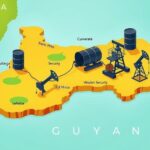Politics
ASIA, CUBA, DENMARK, DIPLOMACY, ESSEQUIBO, EUROPE, FOREIGN POLICY, GREENLAND, GULF, GULF ARAB NATIONS, GULF STATES, GUYANA, GUYANE, INTERNATIONAL RELATIONS, IRAN, JAMAICA, JD VANCE, KUWAIT, LATIN AMERICA, MARCO RUBIO, NATO, NORTH AMERICA, PANAMA CANAL, QATAR, REGIONAL SECURITY, RUBIO, SOUTH AMERICA, STATE DEPARTMENT, SURINAME, TRUMP, UNITED STATES, US, VENEZUELA
Sophia Klein
U.S. Offers Security Support to Oil-Rich Guyana Amid Venezuelan Threats
Secretary Marco Rubio visits Guyana to offer U.S. security amid Venezuelan threats. After discovering significant oil reserves, Guyana is set to become the leading oil producer per capita. Rubio will sign a security agreement to strengthen defense ties, addressing escalating tensions with Venezuela over territorial claims in the Essequibo region.
United States Secretary of State Marco Rubio will visit Guyana to offer the nation security assurances amidst claims from Venezuela, which is perceived as a regional threat. Guyana, after discovering vast oil reserves, is anticipated to surpass Qatar and Kuwait as the world’s largest oil producer on a per capita basis in the upcoming year. The visit aims to establish a memorandum of understanding for enhanced security cooperation between the two nations, addressing rising tensions due to Venezuela’s aggressive posturing.
Following discussions with Caribbean nations in Jamaica, Secretary Rubio’s itinerary includes a stop in Suriname, another neighboring country experiencing a boost in oil production. The Trump administration envisions forging a relationship with Guyana akin to that of oil-rich Gulf states, where U.S. military presence ensures regional security against neighboring threats, particularly Venezuela.
Mauricio Claver-Carone, the U.S. special envoy on Latin America, emphasized the importance of Guyana’s security, equating it to security collaborations the U.S. has established with Gulf states facing similar threats. He noted, “We want to work together to find an agreement towards binding security cooperation,” highlighting the clear risks posed by Venezuela and reinforcing America’s commitment to South American allies.
Guyana’s President Irfaan Ali, who is approaching an election this year, has welcomed deeper defense partnerships with the United States, including cooperative maritime patrols. Venezuela, under President Nicolas Maduro, has claimed significant portions of Guyana, notably the Essequibo region, which is pivotal for oil extraction. Tensions have escalated after Guyana denounced a Venezuelan military vessel’s breach of its maritime boundaries, an assertion Venezuela has denied while seeking diplomatic engagement that has been met with reluctance from Guyana.
Historically, the borders were established by an arbitration panel in 1899 which Guyana still acknowledges, despite Venezuela’s claims tracing back to earlier delineations. As the Trump administration emphasizes the importance of bolstering oil production for economic and national security reasons, it has differed from prior approaches aiming for renewable energy diversification. ExxonMobil, with substantial operations in Guyana, projects significant increases in oil output, outpacing Venezuela’s declining industry, which has been hindered by mismanagement and sanctions.
In summary, Secretary Marco Rubio’s impending visit to Guyana underscores the United States’ commitment to securing its oil-rich ally against Venezuelan aggressions. With the anticipated signing of a security cooperation memorandum, Rubio’s engagement demonstrates a strategic pivot towards enhancing defense ties in the region. As Guyana edges towards becoming a major oil producer, the U.S. aims to bolster relationships that ensure both economic stability and security against regional threats.
Original Source: www.kulr8.com








Post Comment